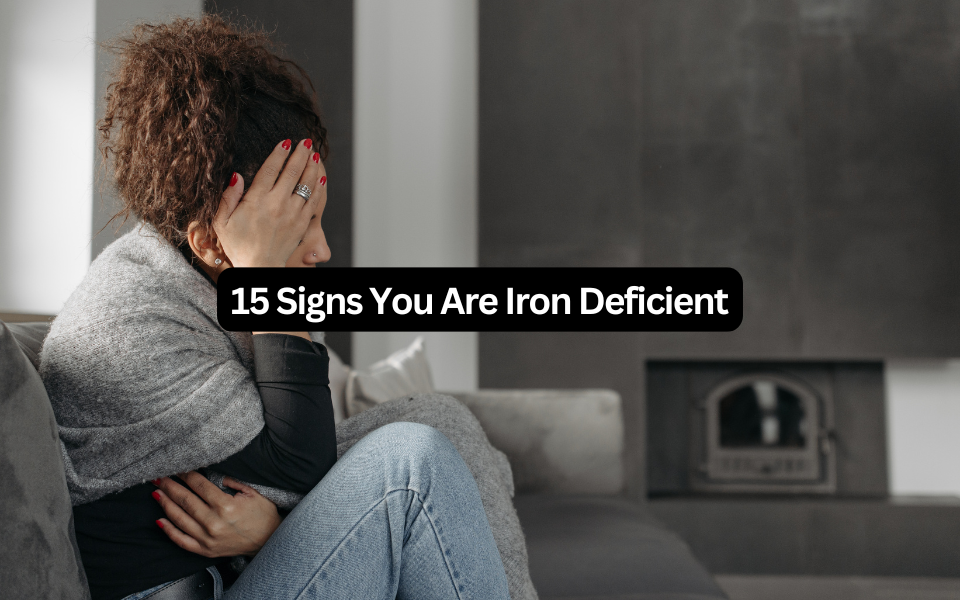What is Iron Deficiency?
Iron deficiency is the most common nutritional deficiency worldwide. It occurs when the body doesn’t have enough iron to produce hemoglobin, a substance in red blood cells that enables them to carry oxygen. Iron is an essential mineral that supports red blood cell production, bone marrow health, muscle function, organ function, and a strong immune system. The body does not make its own iron, so people need to get it from food.
Iron is absorbed through the gastrointestinal (GI) tract and is then either used to build red blood cells or stored for later use. When iron stores are depleted, the body cannot produce enough hemoglobin, leading to iron deficiency.
15 Signs You Are Iron Deficient
Many iron deficiency symptoms are subtle and non-specific, making them easy to miss. Some common signs and symptoms include:
- Fatigue, or always feeling tired, even after sleeping
- Weakness
- Pale or sallow skin
- Headaches
- Dizziness or light-headedness
- Shortness of breath, especially with activity
- Chest pain
- Fast heartbeat or rapid heart rate
- Cold hands and feet
- Brittle nails
- Hair thinning or hair loss
- Sore or smooth tongue, or inflammation of the tongue
- Restless legs
- Foggy thinking or poor mood
- Unusual cravings for non-nutritive substances, such as ice, dirt, or starch

Iron Deficiency and Iron Deficiency Anemia
If left untreated, iron deficiency can lead to anemia, a more serious condition that may cause heart problems and pregnancy complications. Anemia occurs when the blood lacks enough healthy red blood cells to carry oxygen throughout the body. Iron deficiency is the most common cause of this condition. However, iron deficiency can occur without anemia. Regardless of whether it progresses to anemia, iron deficiency can leave some people feeling miserable.
Iron deficiency anemia occurs in stages:
- First Stage: Iron stores decrease, but there is no effect on red blood cells
- Second Stage: The body begins to make red blood cells without enough hemoglobin
- Third Stage: Hemoglobin levels drop below the normal range, and symptoms of iron-deficiency anemia develop
What is a Low Iron Level for a Woman?
Two proteins in the blood are used as a measure of iron levels: ferritin and hemoglobin.
- Ferritin is the storage protein of iron. A blood test showing a ferritin level below 30 ng/mL indicates iron deficiency.
- Hemoglobin is the iron-containing protein in red blood cells that delivers oxygen to the body’s tissues. According to World Health Organization (WHO) guidelines, a hemoglobin level less than 12 g/dL in women indicates anemia.
However, before taking iron supplements, it’s important to get a diagnosis from a healthcare provider to ensure you need them.

How Iron Supplements Can Help
Iron supplements are a common way to treat iron deficiency and iron-deficiency anemia. There are two main types of iron supplements:
Heme vs. Non-Heme Iron Supplements
- Heme iron supplements: Derived from animal sources, heme iron is more easily absorbed by the body and is a good option for those who need higher absorption rates.
- Non-heme iron supplements: Sourced from plants, non-heme iron is less readily absorbed but may still effectively raise iron levels, especially when taken with vitamin C to minimize side effects.
In addition to supplements, dietary changes can help to increase iron levels. Foods rich in iron include:
- Red meat and poultry
- Seafood
- Beans and legumes
- Dark green leafy vegetables
- Dried fruit
- Iron-fortified cereals, breads, and pastas
OptiFer Alpha
OptiFer Alpha is a heme-based iron supplement designed to prevent iron deficiency and iron deficiency anemia. OptiFer’s heme iron is absorbed up to 32% more effectively than non-heme based iron supplements.
Heme iron, like the kind found in OptiFer Alpha, is easily absorbed by the body without being affected by factors like caffeine or vitamin C. Many users find that OptiFer Alpha is gentler on the stomach compared to other iron supplements. Those with sensitive stomachs report that it doesn’t cause nausea, and it is known to be easy on digestion without leading to constipation, a common side effect of other iron pills. Also, OptiFer contains no artificial colors, making it a good choice for those sensitive to additives.
References
American Society of Hematology: Iron Deficiency
Mayo Clinic: Iron-Deficiency Anemia: Symptoms & Causes
Yale Medicine: Are You Iron Deficient? 8 Things Women Should Know
Ferosom Forte: 15 Signs You Might Have an Iron Deficiency
Cleveland Clinic: Iron-Deficiency Anemia
